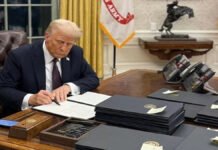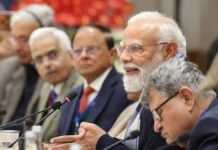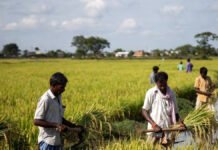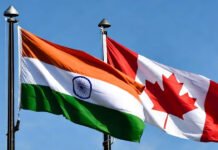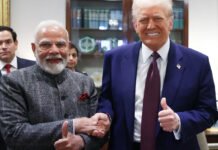INVC NEWS
New Delhi – India and Canada have witnessed a sharp escalation in diplomatic tensions recently, primarily due to allegations surrounding Khalistani extremists in Canada. The situation took a critical turn when India’s High Commissioner to Canada, Sanjay Kumar Verma, openly accused the Canadian Security Intelligence Service (CSIS) of using Khalistani extremists as covert agents. This revelation came at a time when the two countries were already embroiled in disputes regarding the presence and promotion of anti-India elements within Canadian borders.
Background of the Diplomatic Crisis
For years, India has raised concerns over the growing activities of Khalistani separatists on Canadian soil. The Khalistan movement, which seeks the establishment of an independent Sikh state, has long been a sensitive issue for India. However, what initially began as a fringe movement has gained considerable momentum, especially among a section of the Sikh diaspora in Canada.
India’s government, led by Prime Minister Narendra Modi, has repeatedly asked the Canadian authorities to take stringent action against these separatist elements, who often stage protests, promote pro-Khalistan rhetoric, and incite violence against the Indian state. However, Canada, invoking the principles of free speech, has often been hesitant to clamp down on these groups, leading to friction in bilateral relations.
Sanjay Kumar Verma’s Revelations
In an interview with CTV News, Sanjay Verma made bold accusations, stating that Khalistani extremists and terrorists in Canada are not merely fringe elements but deep assets for Canada’s CSIS. He claimed, “These individuals are being actively encouraged and utilized by CSIS,” while asserting that some of these extremists work closely with the intelligence agency.
Verma stressed that the Khalistani elements are not simply activists exercising their democratic rights but are being manipulated by larger intelligence interests. His statement has only added fuel to the fire in the ongoing debate over Canada’s alleged role in harboring individuals who challenge India’s sovereignty.
India’s Concerns Over Khalistani Activities
India’s principal concern revolves around the support and encouragement extended to Khalistani activists, both overtly and covertly, by elements within Canadian institutions. According to Verma, the Canadian government must take India’s apprehensions seriously rather than collaborate with individuals or groups that aim to undermine India’s territorial integrity.
Verma emphasized, “We expect the current Canadian government to sincerely understand and address our concerns.” He further warned that by ignoring these concerns, Canada risks damaging long-standing diplomatic ties. India has always maintained that the fate of its sovereignty is to be determined by Indian citizens and not by external actors.
The Nijjar Assassination Case and Canada’s Allegations
One of the most high-profile cases inflaming the diplomatic row is the assassination of Hardeep Singh Nijjar, a Khalistani terrorist designated by the National Investigation Agency (NIA) in India. Nijjar, a prominent proponent of the Khalistan movement, was killed in Canada, sparking intense diplomatic confrontation. Canada has accused India of playing a role in the assassination, an accusation that India firmly denies.
Verma unequivocally rejected the Canadian government’s claims that India orchestrated Nijjar’s killing, stating, “No concrete evidence has been provided by the Canadian authorities to substantiate these allegations.” He insisted that the charges leveled against India were “politically motivated” and urged the international community to recognize the lack of proof behind these accusations.
Rebuttal of Allegations on Indian Diplomats
Canadian authorities have accused Indian diplomats, including Verma, of collecting intelligence on Khalistani sympathizers and potentially directing individuals to surveil them. Verma categorically denied these charges, explaining that his team relies solely on open-source information such as newspaper articles and social media posts to keep track of individuals promoting anti-India narratives.
He elaborated, “We read newspapers, monitor their social media posts, and analyze public statements to gauge the activities of these groups. We do not engage in covert operations or force anyone to gather information.”
Canada’s Diplomatic Reaction and India’s Retaliation
The Canadian government’s escalating rhetoric following Nijjar’s death prompted India to take a strong stance. Verma, along with five other Indian diplomats, was recalled after Canada declared them “persons of interest” in the assassination. In response, India not only condemned the accusations but also called back its diplomats, underscoring the seriousness of the situation.
India’s official position remains firm: any involvement in Nijjar’s assassination is denied, and the accusations are deemed baseless. India’s stance is that this controversy is part of a larger political maneuver by Khalistani sympathizers and Canadian politicians trying to appease certain domestic voting blocs.



